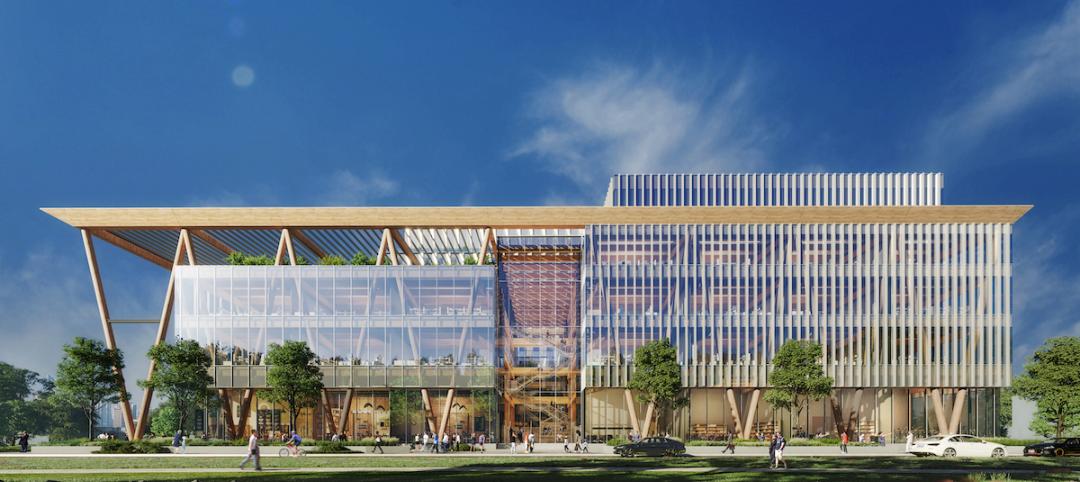Upcoming changes to the Washington State Energy Code are expected to include requirements for dedicated outdoor air systems.
The updates will alter how engineers and architects approach design, writes Max Wilson, a senior energy analyst for Glumac. “Designers are now required to decouple the heating and cooling system from ventilation systems,” Wilson says. “According to the new code language, HVAC systems should now include ‘supply-air temperature controls that automatically reset the supply-air temperature in response to representative building loads, or to outdoor air temperatures.’”
Heating and cooling equipment, because they have been historically linked, have become major sources of wasted energy by pushing fans unnecessarily hard to maintain optimum comfort levels. The new approach will greatly reduce overcooling or overheating interior spaces, Wilson says, and mitigate wasted fan energy.
Another code update requires design teams to choose a minimum of two prescribed of several energy-efficient design strategies. The focus on these “seems to be on reduction of both lighting loads and fossil fuels usage,” Wilson writes. “The code updates focus on enhanced lighting controls, a 25% reduction in lighting power, on-site renewable energy, and high-efficiency domestic hot water sources for 60% of the load (e.g. waste heat recovery or solar hot water systems).” The state’s next group of code change proposals is due in March 2017.
Related Stories
Green | Jan 8, 2024
DOE releases RFI on developing national definition for a Zero Emissions Building
The Department of Energy released a Request for Information (RFI) for feedback from industry, academia, research laboratories, government agencies, and other stakeholders on a draft national definition for a Zero Emissions Building.
Codes and Standards | Jan 8, 2024
Australia to be first country to ban engineered stone countertops
In 2024, Australia will be the first country to ban engineered stone countertops. The ban came after a years-long campaign supported by doctors, trade unions, and workers over concerns that the material was causing increased silicosis cases among workers cutting and handling it.
Roofing | Jan 8, 2024
Researchers devise adaptive roof tile concept that adjusts to ambient temperatures
Scientists at the University of California Santa Barbara published a paper that proposes adaptive roof tile technology that can adjust to ambient temperatures. Using a wax motor, tiles could switch from a heating or cooling state enabling savings on heating and cooling costs.
Mass Timber | Jan 2, 2024
5 ways mass timber will reshape the design of life sciences facilities
Here are five reasons why it has become increasingly evident that mass timber is ready to shape the future of laboratory spaces.
Resiliency | Jan 2, 2024
Americans are migrating from areas of high flood risk
Americans are abandoning areas of high flood risk in significant numbers, according to research by the First Street Foundation. Climate Abandonment Areas account for more than 818,000 Census Blocks and lost a total of 3.2 million-plus residents due to flooding from 2000 to 2020, the study found.
Sustainability | Jan 2, 2024
Los Angeles has plan to improve stormwater capture and source 80% of water locally
Los Angeles County’s Board of Supervisors voted for a plan to improve stormwater capture with a goal of capturing it for local reuse. The plan aims to increase the local water supply by 580,000 acre-feet per year by 2045.
MFPRO+ News | Jan 2, 2024
New York City will slash regulations on housing projects
New York City Mayor Eric Adams is expected to cut red tape to make it easier and less costly to build housing projects in the city. Adams would exempt projects with fewer than 175 units in low-density residential areas and those with fewer than 250 units in commercial, manufacturing, and medium- and high-density residential areas from environmental review.
Urban Planning | Jan 2, 2024
Federal Highway Administration releases updated traffic control manual
With pedestrian deaths surging nationwide, the Federal Highway Administration released a new edition of the Manual on Uniform Traffic Control Devices for Streets and Highways. The manual contains standards for street markings and design, standardizing signage, and making driving as seamless as possible.
Engineers | Dec 22, 2023
ACEC report identifies opportunities for improving diversity for engineering firms
The ACEC Research Institute recently released a Diversity Roadmap presenting the state of diversity, equity, inclusion, and belonging (DEI&B) in the engineering industry.
Contractors | Dec 22, 2023
DBIA releases two free DEI resources for AEC firms
The Design-Build Institute of America (DBIA) has released two new resources offering guidance and provisions on diversity, equity, and inclusion (DEI) on design-build projects.
















